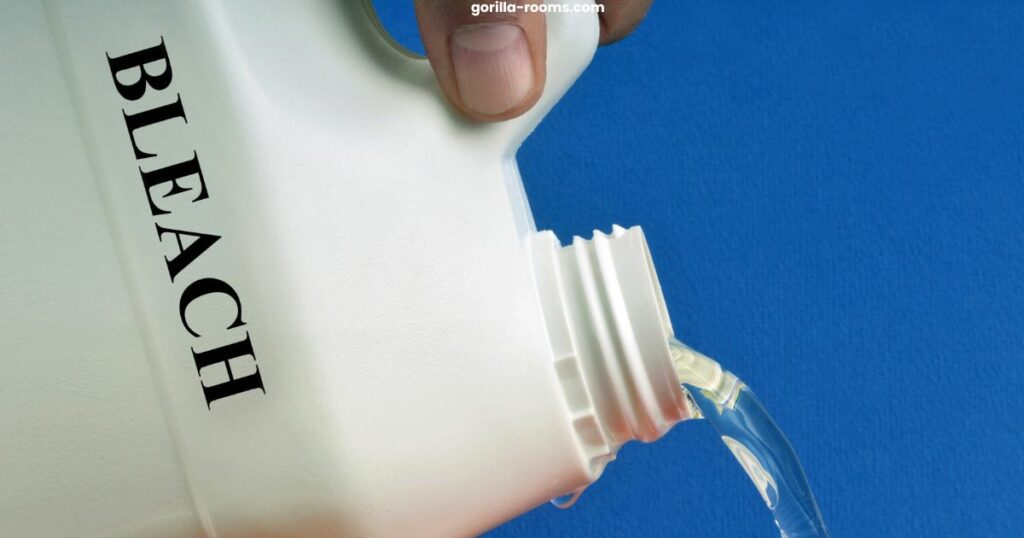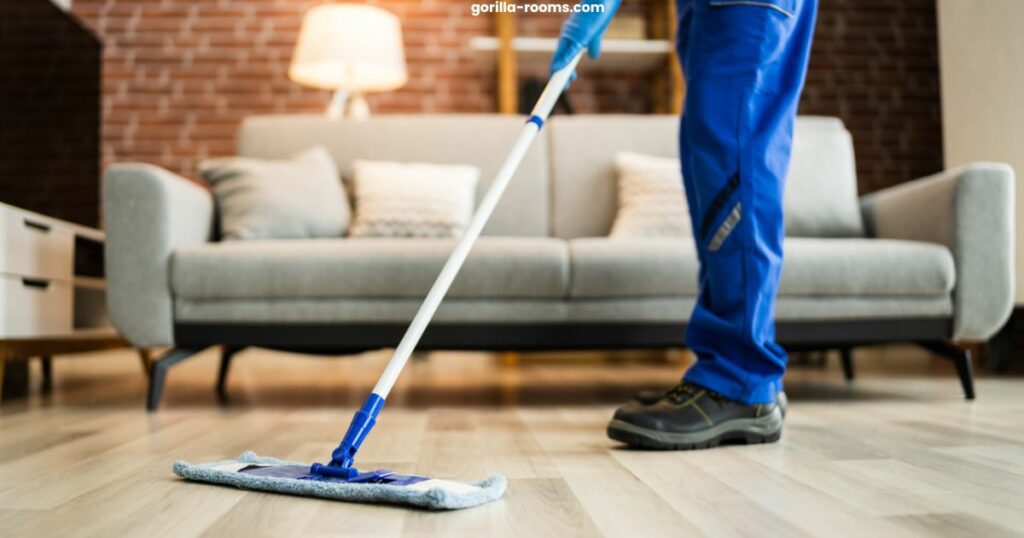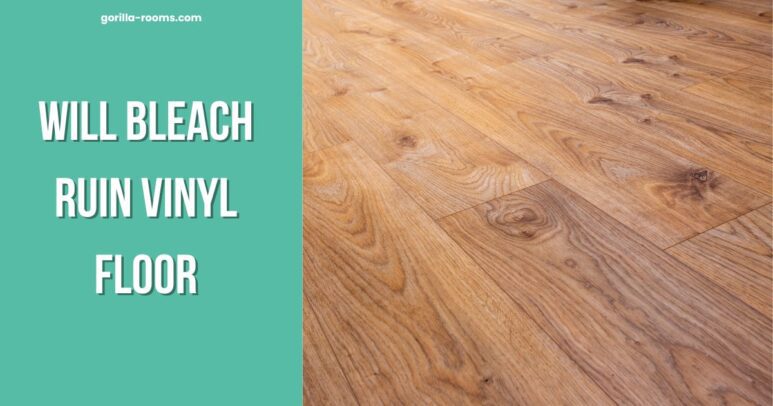Vinyl flooring is one of the most common types of flooring in homes. Despite being common, many people are unaware of how to clean it correctly. The biggest mistake you can make with a vinyl floor is using incorrect cleaning agents.
Bleach is a common household cleaning agent for vinyl floors. It helps to eliminate stubborn stains from hardwood. But most people think that bleach will ruin the Vinyl floor.
In this article, I’ll share my experience of how effective or damaging bleach can be for your vinyl floors.
Additionally, I’ll provide you with some tips on how to care for your vinyl flooring. You want it to last as long as feasible; I know that.
Let’s dig in!
Will Bleach Ruin Vinyl Floor?

Bleach is a harsh chemical that can harm vinyl flooring by causing cracking or even shedding. The extent of bleach damage also depends on how old your floor is. An older vinyl floor is more susceptible to damage from bleach.
The protective or wear layer on floors deteriorates with time, making your vinyl print more prone to harsh chemicals in bleach.
Evaluating the protective layer’s condition is not always possible, so we don’t recommend using bleach on vinyl floors.
What is the Best Way to Clean Vinyl Floors?

Vinyl flooring needs to be handled with particular care and attention. These floors can rapidly lose their shine if you don’t properly clean them. Even worse, using the wrong products on newly installed Vinyl flooring can nullify their warranty.
I’ll discuss a reliable do-it-yourself floor cleaning method and suggest an easy homemade cleaner that won’t leave a residue.
Dry Clean Your Vinyl Floors Before You Start Cleaning
Before doing anything, clean your floors to remove as much dirt, dust, and debris as possible. The loose materials can be swept up with a soft broom or mop.
Use a vacuum or a dust mop to clean the grit each day. To avoid denting vinyl flooring, use a setting that doesn’t activate the beater bar when vacuuming. Use a wet toothbrush or scrub brush as a pre-cleaner for those difficult-to-reach regions.
Wet Clean your Floors
You don’t need to be particularly careful about spilling too much water on vinyl surfaces because they are waterproof. However, you still need to dry your mop thoroughly.
In the worst situation, too much water may seep into the fibers and harm the internal surfaces of the floors.
Mix Your Cleaning Solution
Add a cleaning agent of your choice and warm water to your washing bucket. If you’re in the kitchen, pick a degreaser or other antibacterial cleaner to clean up the spills from your floor.
Avoid using too much of your product, as it can damage the surface.
Homemade Cleaning Solution for Vinyl floors
If you don’t have any cleaning supplies or want to stay away from abrasive cleaners, I’ll share the best homemade vinyl floor cleaning solution.
Combine a few drops of apple cider vinegar with warm water. Baby oil can be added to your homemade cleaning solution if you want to add a little more shine after deep cleaning. Apply the cleaning solution and mop the floor thoroughly.
Wash Thoroughly to Remove all Soap Residue
After mopping, if your surface feels sticky, mix plain water with one cup of distilled white vinegar in a spray container. Apply vinegar solution to the surface with a sprayer and clean it with paper towels. Only wipe one way; you’ll have a spotless, residue-free surface.
Use a Soft Cloth to Dry the Surface
Dry the vinyl surface with a soft, dry microfiber cloth after rinsing it with clean water. The adhesive holding the vinyl together will become damaged if the floor is completely submerged.
Avoid using fans or dryers to hasten the process because too much heat can harm your carpeting.
Common Causes of Vinyl FLOOR Discoloration
Vinyl flooring is renowned for its durability and shine; however, a few things can harm it and make it appear discolored. Let me explain the most common ones.
1- Inaccurate Installation
One of the most frequent causes of discoloration is an improper fitting. A floor with the poor installation may allow moisture to seep through, harming the tiles from below.
The color finish can be diluted, and the design is altered when dampness reaches the design layer, leading to discoloration.
Using too much adhesive when putting glue-down flooring is another common error. Overuse of the adhesive can cause the extra material to show through the planks and give them a stained appearance.
2- Rigid and Liquid Spills
Liquid accidents like juice or vegetable oil and solid spills like greasy food can stain the floor. Some fruits and veggies can also leave unsightly stains behind. Spills must be cleaned up as soon as possible.
3- Makeup, Markers, and Crayons
If you don’t clear up any makeup right away, it can easily spill onto your floor and stain the vinyl surface. Foundation, blush, powders, and powder eyeshadows are the primary offenders.
Crayons are typically made up of wax. Wax can interact with the vinyl boards’ top coat and cause it to break down, exposing the design layer to other chemicals and moisture effects.
Permanent markers are difficult to erase but may not affect the vinyl layers. Many people attempt to scrub off permanent markers by damaging the vinyl planks.
4- Chemicals’ Effects
Bleach is the most common option for removing discoloration stains. But this substance is too harsh and may harm the vinyl’s protective coating.
Ammonia and most floor cleaners are other harsh chemicals you should be mindful of. If you want to use a commercial product for cleaning vinyl floors, keep those made for vinyl flooring.
How to Care for Vinyl Flooring?
The vinyl floor is shiny when it is first installed. It elevates the aesthetic quality of the entire house. But that shiny newness will eventually deteriorate if you don’t perform routine maintenance.
I have some useful advice for caring for and maintaining your vinyl flooring.
1- Mopping
You must use a mop mixture that will leave your floors sparkling! Just use lukewarm water and a cleaner with a neutral pH. Alternatively, you could mop the surface with an equal mixture of warm water and vinegar.
Additionally, this mixture will assist in eliminating any offensive odors and keep your luxury vinyl flooring looking brand-new!
2- The Milder, the Better
Bleach and harsh chemicals can harm vinyl surfaces. The gentler and milder the cleaning solution, the better it would be for vinyl floors. Using commercial floor cleaners made especially for vinyl is the best option.
3- Sweep Often
For sweeping, I advise keeping a soft-bristled broom. Every day sweeping will keep the floors looking better for much longer if you can spare a minute. The likelihood of developing scuff marks and discoloration increases as dirt on the floors increases.
Clean Stains
Stains do occur. When something is spilled and not immediately noticed, it can overnight dry and stick. When dealing with stains, make sure to clean up spills right away.
You definitely do not want to harm your shine with certain detergents and bleaches. Use a floor polish that has been recommended, and rinse it up as soon as you can!
Conclusion
In short, your vinyl floor should remain beautiful with appropriate maintenance and perfect cleaner. Bleach is a harsh cleaner that can harm your vinyl surface.
Keep in mind that these vinyl surfaces are very delicate. Since bleach damage and stains are regrettably irreversible, try to avoid using bleach as much as possible.

